Plenković: Trust Between Bosniaks and Croats in Federation Needs To Be Restored
ZAGREB, 7 May 2022 - Croatian Prime Minister Andrej Plenković said on Friday it was necessary to restore the trust between Bosniaks and Croats in the Federation entity of Bosnia and Herzegovina because without it, it would be difficult to ensure the functioning of the country which is choosing a new parliament in October in accordance with the old law.
The issue of Croats in Bosnia and Herzegovina is important to Croatia and it is regrettable that the Bosniak and Croat parties have failed to reach an agreement on the electoral law reform ahead of the 2 October general election despite US and EU mediation, Plenković said at a working dinner held as part of the Global Europe Seminar in Salzburg on Friday.
In the autumn, "institutions will again be elected according to the old law and one constitutional people will not have its legitimate representatives," the prime minister said and added: "That's why we will try to restore the trust between Bosniaks and Croats in the Federation because it will be difficult for the country to function without it."
Earlier this week, the Central Election Commission of Bosnia and Herzegovina called the general election for 2 October even though the election law was not amended to prevent the more numerous Bosniaks from outvoting the Croats and to ensure the election of legitimate representatives of the Croats.
War in Ukraine
Speaking of the war in Ukraine, Plenković said that Russia had largely underestimated Ukraine's resistance, adding that Ukraine should be assisted in different areas and its ambition to get a special status in the EU should be supported.
"Russia has largely underestimated Ukraine, the courage of its people, the heroism of its soldiers and their determination to to fight back," the PM said. "We should support Ukraine's ambition to get a special status in the EU, but we should also support the EU membership ambitions of other countries."
He went on to say that the COVID-19 pandemic and the Ukraine conflict have diverted attention from other global crises such as the nuclear threat from North Korea, negotiations with Iran, tensions in the South China Sea, US-China relations, climate change and illegal migration. "Unfortunately, none of these have disappeared."
Plenković said that the situation in the Western Balkans should be monitored closely. "We must not let those issues be overshadowed because they, too, require action."
Noting that "every crisis is, at the same time, an opportunity," the prime minister praised the EU for its COVID-19 response, saying that it was a sign of European solidarity that showed the Union's purpose and mission.
Plenković estimated that it was too early to say whether the EU would manage to resolve the energy crisis in the same way, by showing solidarity, expressing hope that it would.
He mentioned the strategic decision to phase out the EU's dependence on Russian energy sources by taking into account the specific circumstances of each country and creating alternative supply routes and networks. In this context, he emphasised the importance of the LNG terminal on the Croatian island of Krk.
For more, check out our politics section.
Fitch Reaffirms Croatia's Rating at 'BBB' With Positive Outlook
ZAGREB, 7 May 2022 - The Fitch Ratings agency has affirmed Croatia's investment rating at 'BBB' with a positive outlook, estimating that the recovery of the country's tourism industry will support the economy at a time of slowing exports and that eurozone entry will mitigate financing risks.
Fitch revised down its projection of Croatian growth for 2022 from 4.4% to 3.3%, citing base effects and a sharp slowdown in household consumption as high inflation affects consumer spending.
"A slowdown in key trading partners, primarily the eurozone, will affect goods export performance this year but we expect key services sectors such as tourism to continue to recover given the country's structural advantages," the agency said.
"We expect GDP growth to gather pace in 2023 (3.7%) assuming a reduction in external risks and a pick-up in investment momentum, driven by EU programmes. We estimate EU transfers of up to 5pp of GDP per year over the next four years, which will sustain economic momentum," it added.
Limited links to Russia and Ukraine
Croatia is less exposed to the unfavourable macroeconomic consequences of the Russia-Ukraine conflict than other countries in the region. "Direct links to Russia and Ukraine are very limited in terms of exports (less than 1.5% of total), investment and tourism (1%)."
Although energy import dependency is similar to the EU average (56%), Croatia has invested to diversify away from Russian energy sources, last year opening an LNG terminal that allows it to reduce its exposure to Russian gas to zero. Nevertheless, the country is highly exposed to higher energy costs, as well to potential further disruptions to supply-chains.
Lower deficit and debt
Croatia's fiscal deficit narrowed rapidly in 2021, to 2.9% of GDP, thanks to solid revenue growth and expenditure restraint, Fitch said, revising down its deficit forecast from last November by 1.4 percentage points.
"Although we expect revenue growth to remain strong this year, demands for higher expenditure to tackle rising inflation—beyond the 1.1% of GDP that has already been approved—are likely to continue. This will limit the scope for further improvement of the headline deficit in 2022, although over-performance in 2021 means there is a good starting position. We forecast headline deficit of 2.8% in 2022, before narrowing to 1.9% in 2023 with modest downside risks, given strong commitment to fiscal prudence," the agency said.
The public debt/GDP ratio fell to 79.8% in 2021, a reduction of 7.8pp from 2020, thanks to the improved fiscal position and rapid economic expansion. It is expected to fall further to 75.5% in 2022 and 72.6% in 2023.
"Modest primary deficits and high nominal growth (in particular in 2022) support our forecast of an average 3pp reduction in the debt stock per year over the next five years (similar rates to those in 2016-2019). This trend would be consistent with meeting convergence criteria, despite the fact that public/debt GDP will remain above the 60% Maastricht debt ceiling (and compared with the current BBB median of 55%). We expect financing costs to rise gradually, in line with global trends, but the process of euro-adoption plus sound debt management reduce financing risks," Fitch said.
Euro adoption
Croatia has met all structural reform criteria required under ERMII and at present meets most of the convergence criteria, including interest rate, exchange rate and public finances. Questions remain around meeting price stability criteria, especially in the context of rising inflation in recent months. It reached 7.3% in March, the highest level since 2008, and averaged 4.07% in April 2021-March 2022.
Since inflation has risen across the EU, Fitch believes "the EU will use the flexibility provided in the convergence criteria (removing the inflation rates of some member states it considers outliers from the calculation) when assessing Croatia in May, with a likely positive outcome by July."
"At present we do not expect a delay of more than one year in euro accession if the country fails to meet the inflation criteria this year, as we consider that there is a clear commitment at EU level to expedite the process," it added.
The agency said it might downgrade Croatia's rating in the event of a significant delay in the timeline of eurozone accession or a renewed increase in general government debt over the medium term.
On the other hand, the rating would be upgraded if the EU Economic and Affairs Council confirms that Croatia has met its eurozone membership criteria.
Another factor that could lead to an upgrade is "evidence of improvement in medium-term growth prospects, for example via implementation of structural reforms or EU-led investment, that could lead to faster than expected reduction in general government debt/GDP.
For more, check out our business section.
Value of Construction Work in Zagreb in 2021 Up By Over 20%
ZAGREB, 7 May 2022 - The value of construction work and new orders in Zagreb increased by over 20% in 2021 compared with the previous year, according to data provided by the city's statistics office.
Last year, the value of construction work carried out by own workers was HRK 7.5 billion, which is an increase of 22.8% from 2020 when it amounted to HRK 6.1 billion.
By type of construction work, 70.7% of the value of the work done accounted for newbuilds and 29.3% for other works, including reconstruction, repairs and maintenance.
By type of structures, the value of work done on traffic infrastructure was slightly less than HRK 3 billion, accounting for 39.5% of the total value. The value of work on non-residential buildings was HRK 2.15 billion (28.7%), the value of work on residential buildings was HRK 1.2 billion (16.5%), while the value of work on other structures was HRK 1.1 billion (15.3%).
A total of 789 building permits were issued in 2021, up by 6.6% from 2020. Most of them, 676 or 85.7%, were issued for the construction of buildings and 113 or 14.3% for other structures.
(€1 = HRK 7.5)
For more, check out our business section.
PM: Confidence of Credit Rating Agencies Shows Croatia is on Right Track
ZAGREB, 7 May 2022 - The confidence of international credit rating agencies shows that Croatia has remained on the right track after a strong economic recovery in 2021, Prime Minister Andrej Plenković said on Saturday.
His statement came after the Fitch Ratings agency reaffirmed Croatia's investment rating at BBB with a positive outlook.
The government sees this as an indication of the country's economic stability while dealing with the consequences of the Russian military invasion of Ukraine, inflationary pressures and other challenges.
The trend was reversed during the term of the present government. Fitch restored the credit rating to BB+ in January 2018 and to BBB- in June 2019. On 13 November 2021, the agency upgraded the rating for another notch to BBB with a positive growth outlook, the government said in a statement.
"The confidence of international credit rating agencies shows that, after a strong economic recovery in 2021, Croatia remains on the right track. We continue to stimulate growth by implementing structural reforms and further using EU funding," Plenković said.
He noted that in all the crises so far the government had stood firmly behind the citizens, helping them with sets of measures to alleviate the impact of increased energy prices and inflationary pressures.
"Euro area membership next year will bring many benefits to the Croatian citizens and businesses while at the same time making the country more resilient to crises," the prime minister said.
The government statement said that the positive outlook was based, among other things, on the assumption that Croatia will be in a position to adopt the euro as legal tender on 1 January 2023 given that it meets the criteria and reform measures under the ERMII mechanism. Fitch considers highly like a positive outcome for Croatia's accession to the euro area this year.
Fitch projected Croatia's growth rate for 2022 at 3.3%, which is more than the 3.0% forecast by the Ministry of Finance, and expects growth to pick up to 3.7% in 2023, which would spur investment as a result of the use of EU funding, the government said.
For more, check out our business section.
Plenković Accuses Milanović, Bridge of Hypocritical Policy Towards Bosnia Croats
ZAGREB, 3 May 2022 - Prime Minister Andrej Plenković said on Monday evening that President Zoran Milanović and his "supporters" from the Bridge party were pursuing a hypocritical policy aimed at doing harm to the government and to the Croats in Bosnia and Herzegovina.
Plenković said that Milanović's proposal that members of the Croatian parliament should vote against the accession of Finland and Sweden to NATO was perfidious.
"He (Milanović) has not said that he will block their accession. He has disseminated a perfidious, even worse claim. It was him who said that he would call MPs traitors and he insisted that the Parliament should block (their accession)," Plenković said explaining "the perfidious situation" created by Milanović.
The PM elaborated that this political game was aimed at destabilising Croatia's institutions, the government, and doing harm to the Croats in Bosnia and Herzegovina.
He also noted that as far as he could see, only Milanović was against Sweden's and Finland's membership of the alliance, while nobody else in NATO supported such idea.
"Such attitude against NATO's expansion is a pro-Russian stance. He is the only one who advocates that. Only those who advocate pro-Russian views can be satisfied with such attitude," Plenković said, recalling Milanović's criticism of Ukraine.
Plenković noted that Milanović's pro-Russian position does harm to Croatia in international circles and also to the Croats in Bosnia and Herzegovina.
As for the election law in Bosnia and Herzegovina, Plenković said that the election system in that country was bad not only for the Croats but also for the whole of Bosnia and Herzegovina.
Croatia's government believes that the election law must be amended, he added.
The government works on that consistently, it holds talks with the Bosniaks, the Croats and partners in the international community on that topic, Plenković added.
48 Hours in Osijek: Slavonian Pot of Content
30th of April 2022 - Green City, Lega City, Bike City, a City on Drava River... Osijek has earned a lot of names through the years and today is one of the most contemporary places in Croatia. A look into how you can spend 48 hours in Osijek.
In recent years, TCN wrote on multiple occasions about how the city of Osijek has every characteristic of a modern European town - culture, history, recreation, developed IT sector, student city with a lot of youth, enormous potential, and so on. Furthermore, the tourist offer became so diverse in the last few years that Osijek became a city for everyone.
For this list, we decided to split time frames into two sections: day one, which would be reserved for relaxing exploration of the city, and day two, for more recreational and exciting options. Now, without further ado, let’s start our 48 hours in Osijek guide!
9.00 a.m - 10.30 a.m
Every good day needs to start with a good breakfast and what is better than Restaurant Waldinger’s cuisine? Very few. Cozy ambient, calm atmosphere, great food, and the beautiful Osijek Co-cathedral of St Peter and St Paul just down the street with breakfast that stems from Slavonian and traditional to modern and worldly. For day one, we definitely suggest Waldinger.
Day two can start with something stronger - food on a stick. Fast food and street food restaurant Hokus Pokus is located just down the street from the previous selection and serves everything from breakfast to dinner. Meaty products aren’t the only food available - veggie options are also proudly displayed in this urban restaurant. Tortillas, kebabs, ćevapčići, and tasty salads are truly a good start for an active day in Osijek.
11.00 a.m. - 1.00 p.m.
Day one can be spent in various ways - just stroll through the city on foot and visit numerous green parks like King Petar Krešimir the Fourth Park that’s surrounded on all four sides by beautiful maple trees and King Tomislav Park which connects European Avenue and Tvrđa with its beautiful row of poplars. Since you’re already there, why not use that opportunity and visit, already mentioned, the old town of Osijek, Tvrđa. It’s the best-preserved ensemble of Baroque buildings in Croatia and has a Habsburg star fort built on the right bank of River Drava. Tvrđa also has a culturally rich Museum of Slavonia, that consists of art and heritage stemming from baroque to recent creations.
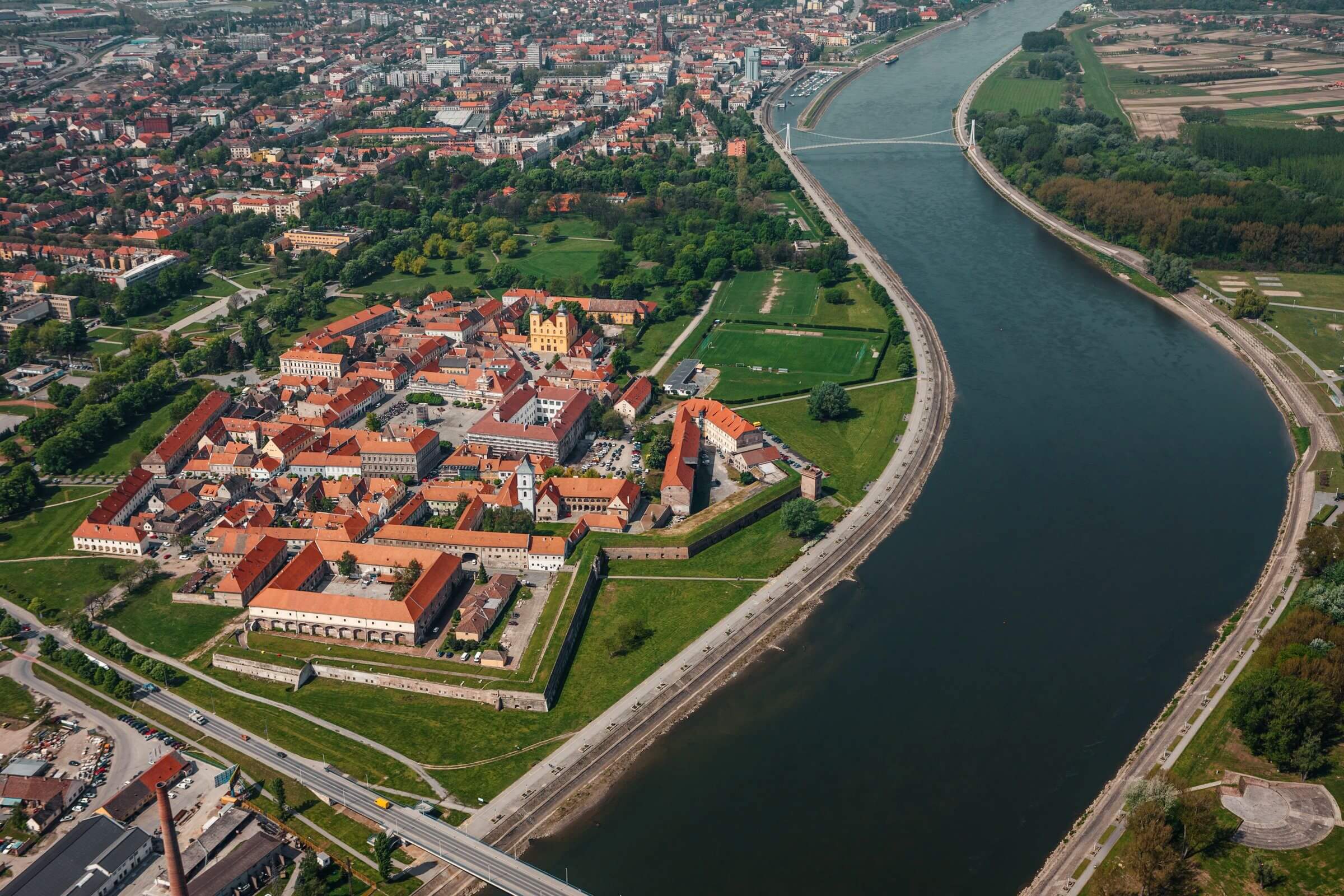
Tvrđa (photo credit: Mario Romulić)
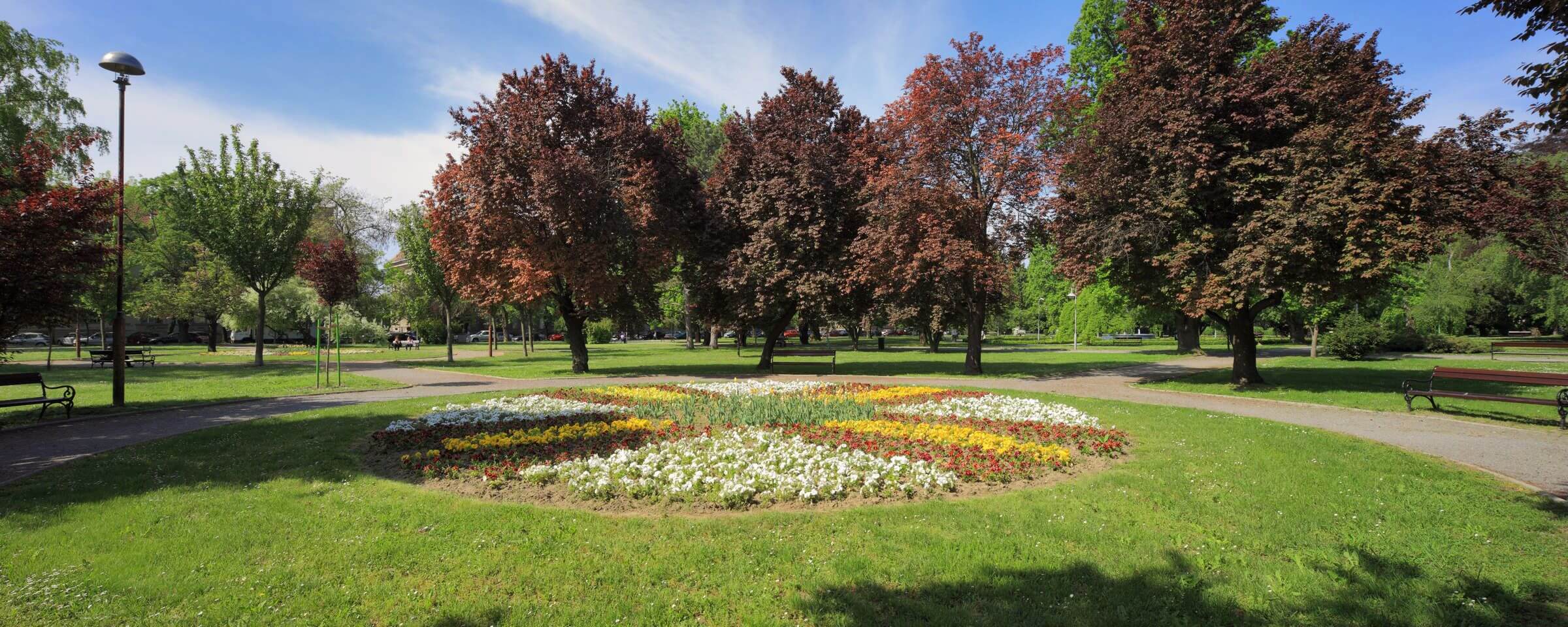
King Petar Krešimir The Fourth Park (photo credit: Mario Romulić)
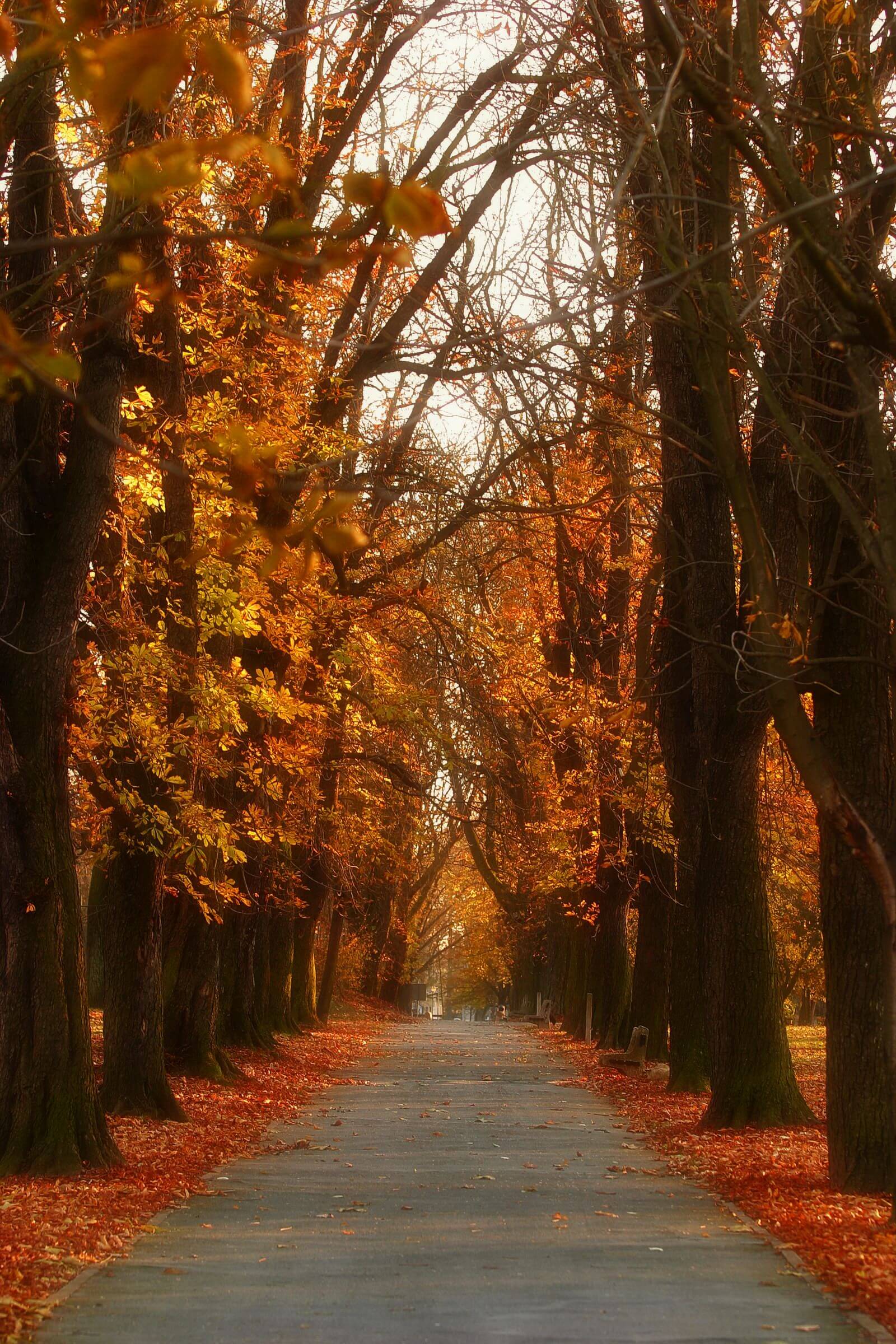
King Tomislav Park (photo credit: Mario Romulić)
After Tvrđa, use that time to sit down and have a cup of coffee - an obligation that’s never skipped in Croatia with the view of the Museum of Slavonia, faculties, schools, and old Churches of Saint Michael and Holy Cross.
The recreationally active day two can be used for biking through the city - Osijek has one of the most developed bike tracks in Croatia so if you’re even a little bit interested in being active while on holiday, biking through Osijek is a must.
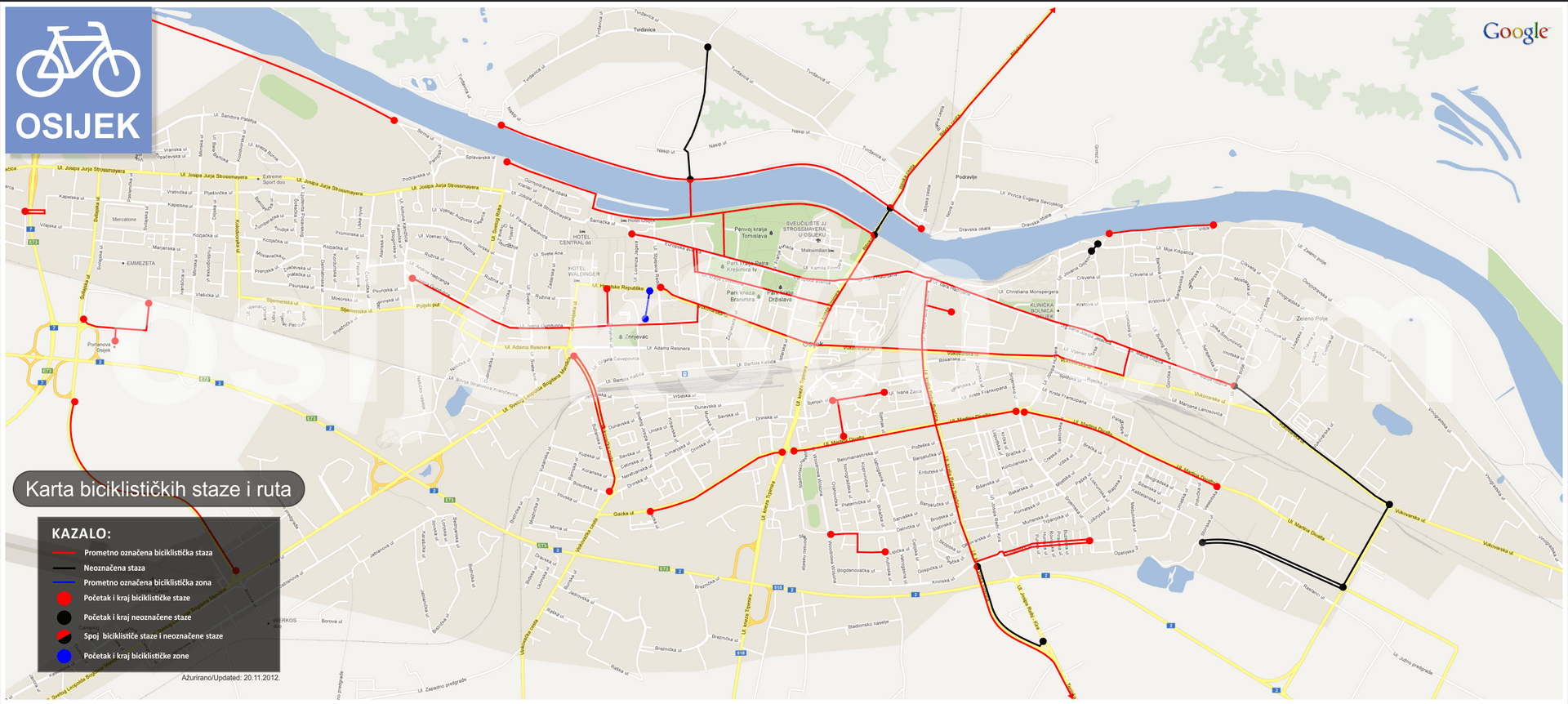
City bike routes (screenshot: www.osijek360.com)
While you're biking, cross River Drava over the popular "Bridge of youth", now symbols of Osijek, or take "kompa" and go to Osijek ZOO. "Kompa" is one of the symbols of Osijek as well - a means of transport powered only by Drava River currents transporting residents of Osijek since 1916. There's another option: take both! You can transport your bikes on "kompa" as well.
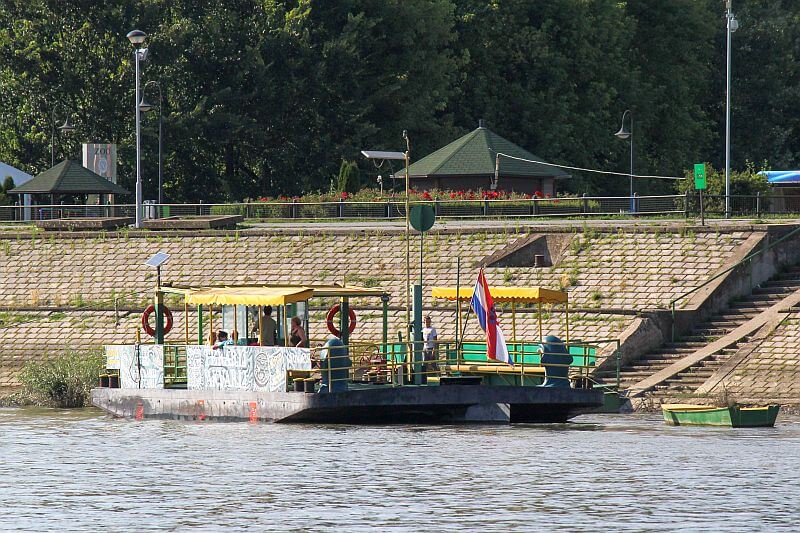
Popular "kompa", faithful "carrier" of Osijek residents since 1916 (photo credit: www.tzosijek.hr)
Osijek ZOO has been founded in 1955 and thanks to the location away from the city noise, it’s the perfect place for the peaceful stay of 80 species of animals. Next to the ZOO, there’s a hotel and catering facility with a children’s playground and a view of River Drava. All of that is near the beautiful Podravina forest.
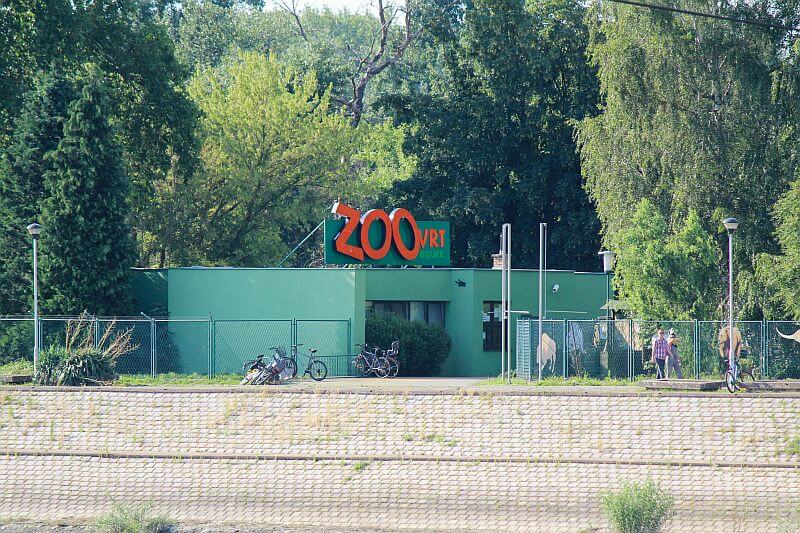
Osijek ZOO (photo credit: www.tzosijek.hr)
2.00 p.m. - 4.00 p.m.
After some sightseeing, day one should surely feature a really good lunch. If you’re near Tvrđa, definitely check out El Paso for traditional Slavonian food and strange location - on a boat on Drava River! Restaurant and pizzeria Strossmayer no.2 is located near Drava River and has already mentioned traditional dishes, however, they have multiple options like dishes from all over Europe, great pizzas and many more, with amazing Slavonian wines like pinot, chardonnay, merlot and graševina.
Options outside Tvrđa are located near the center of Osijek and its Downtown like restaurants Zeleni Val and Makedonka which are battling for the title of best čevapćići in Osijek. It’s for you to decide, Slavonians are still discussing. All of that soaked with the famous black Radler from Osječko? Name us a better combination.
More active day two requires a healthy amount of heavy food (which is a blatant oxymoron) so why not visit pubs which are definitely not lacking in Osijek. Rich beer culture always comes with pub food that can only be found in Croatia. So why not try local beer brews like American Pale Ale, Irish Dry Stout, and Czech Pilsner from Beckers Craft Brewery with homemade hamburgers that make you salivate? Few options are available: Merlon Pub located in the heart of Tvrđa, there is American Bar Dollar in the center of Osijek, and many more.
5.00 p.m. - 7.00 p.m.
After stuffing yourselves with Osijek cuisine, your 48 hours in Osijek can't pass without more sightseeing and why not use that time to visit famous European Avenue. At the beginning of the century, Osijek was the “stage” for European trends in architecture and the biggest trace left Art Nouveau. Walking on the Avenue, you’ll witness magnificent urban villas from that time with the Main Post Office and Urania Cinema, which is one of the oldest working cinemas in Croatia. On the way, visit Sakuntala Park - a specific park that has a sphinx at the entrance. Strange, isn’t it?
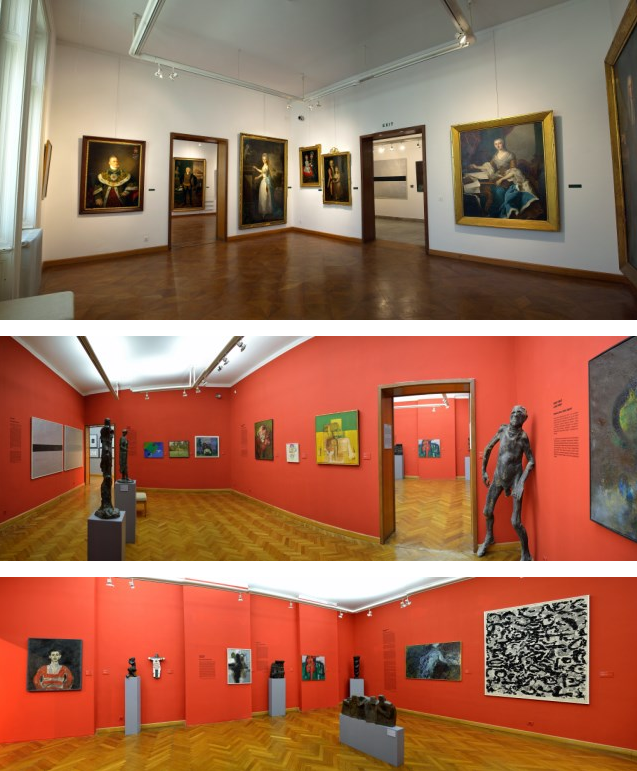
Museum of Fine Arts Osijek located on European Avenue (screenshot: www.mlu.hr)
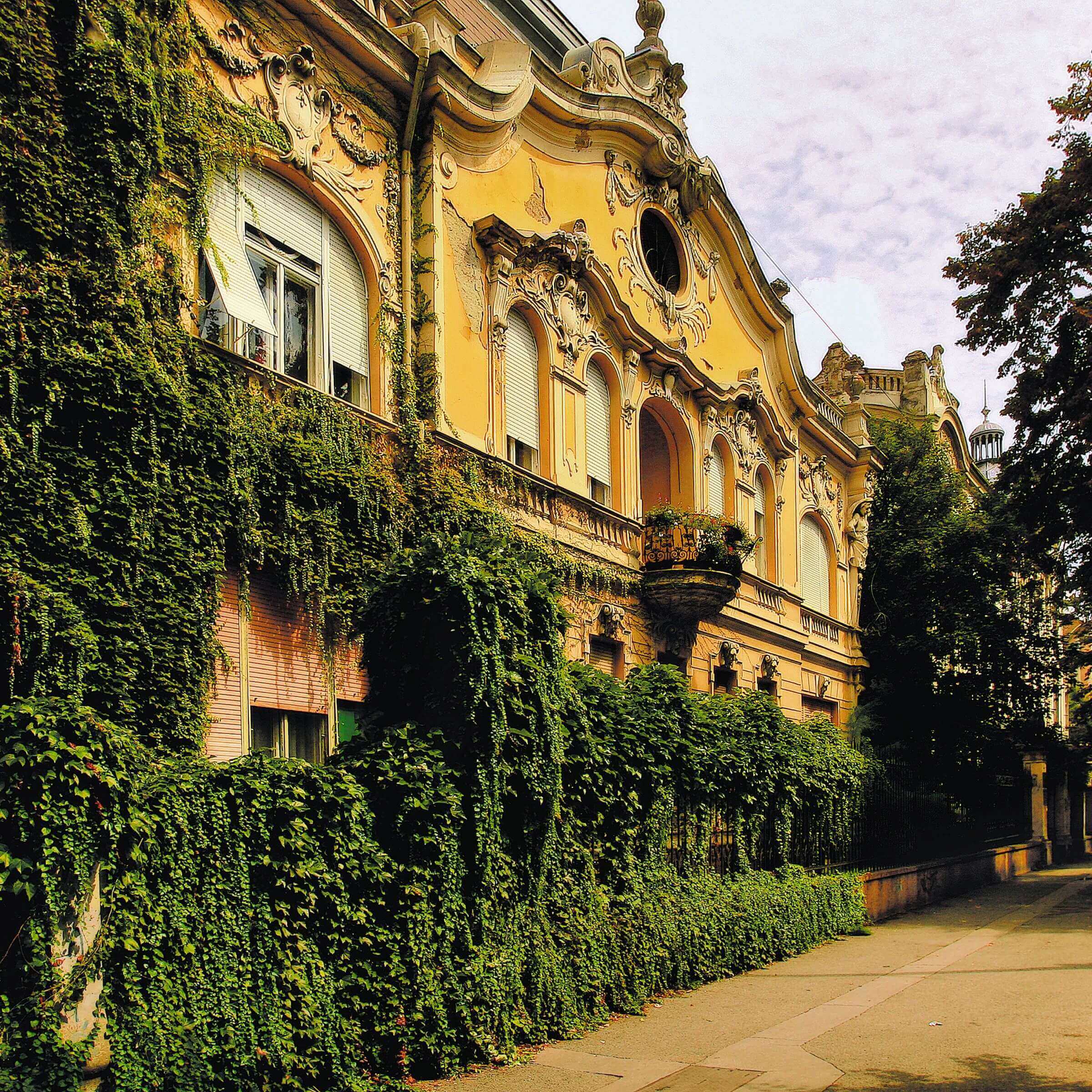
Art Nouveau villa at European Avenue in Osijek (photo credit: Mario Romulić)
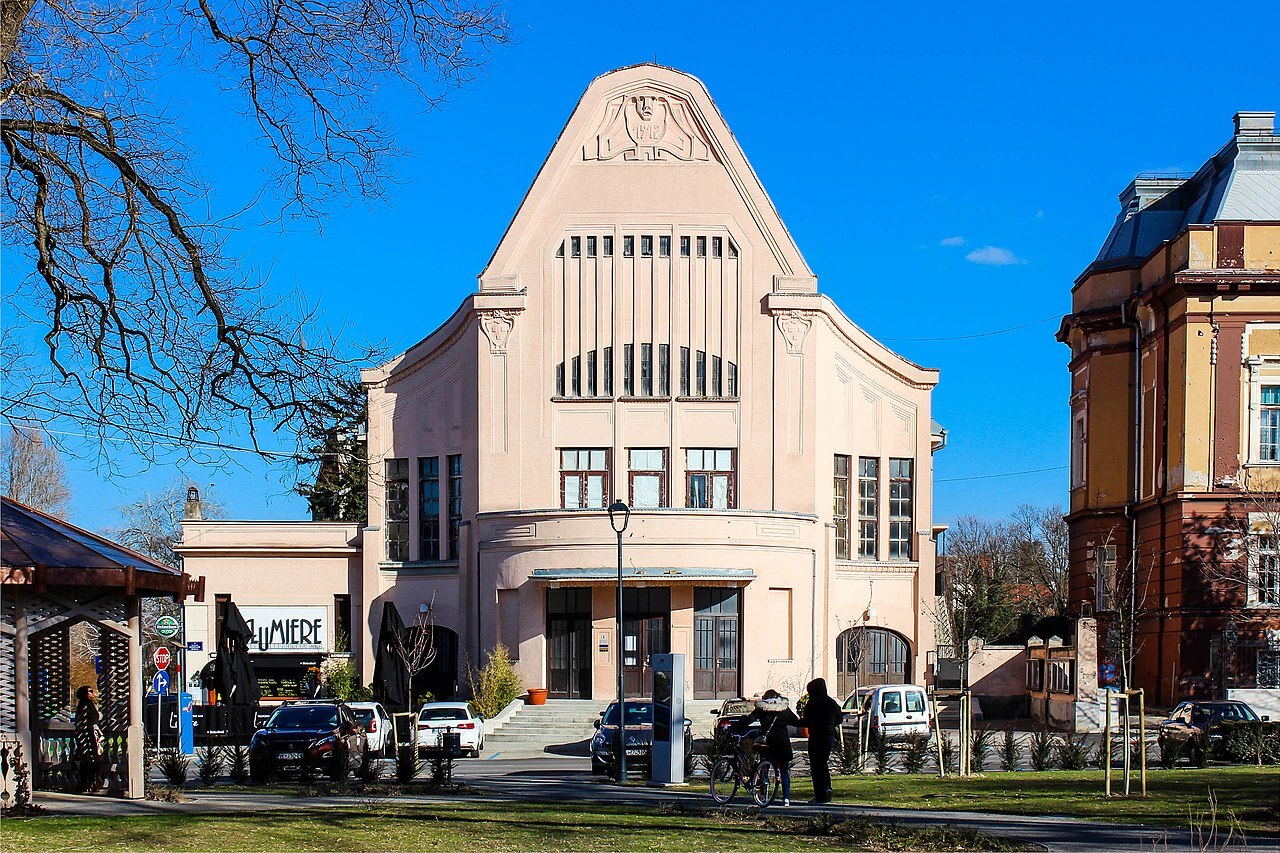
Cinema Urania (photo credit: wikiwand.com/Arhitektura_secesije_u_Osijeku)
On the way, you have already mentioned the beautiful Osijek Co-cathedral of St Peter and St Paul which is an ultimate symbol of Osijek. One of the most important people in Croatian culture, Osijek native and icon, Josip Juraj Strossmayer, gave the initiative to build this magnificent neo-gothic building in the 19th century that still stands tall even today. Besides Zagreb Cathedral, Osijek Co-cathedral is the tallest one in Croatia - its grandiose appearance and ethereal atmosphere bring you back to past forgotten times.
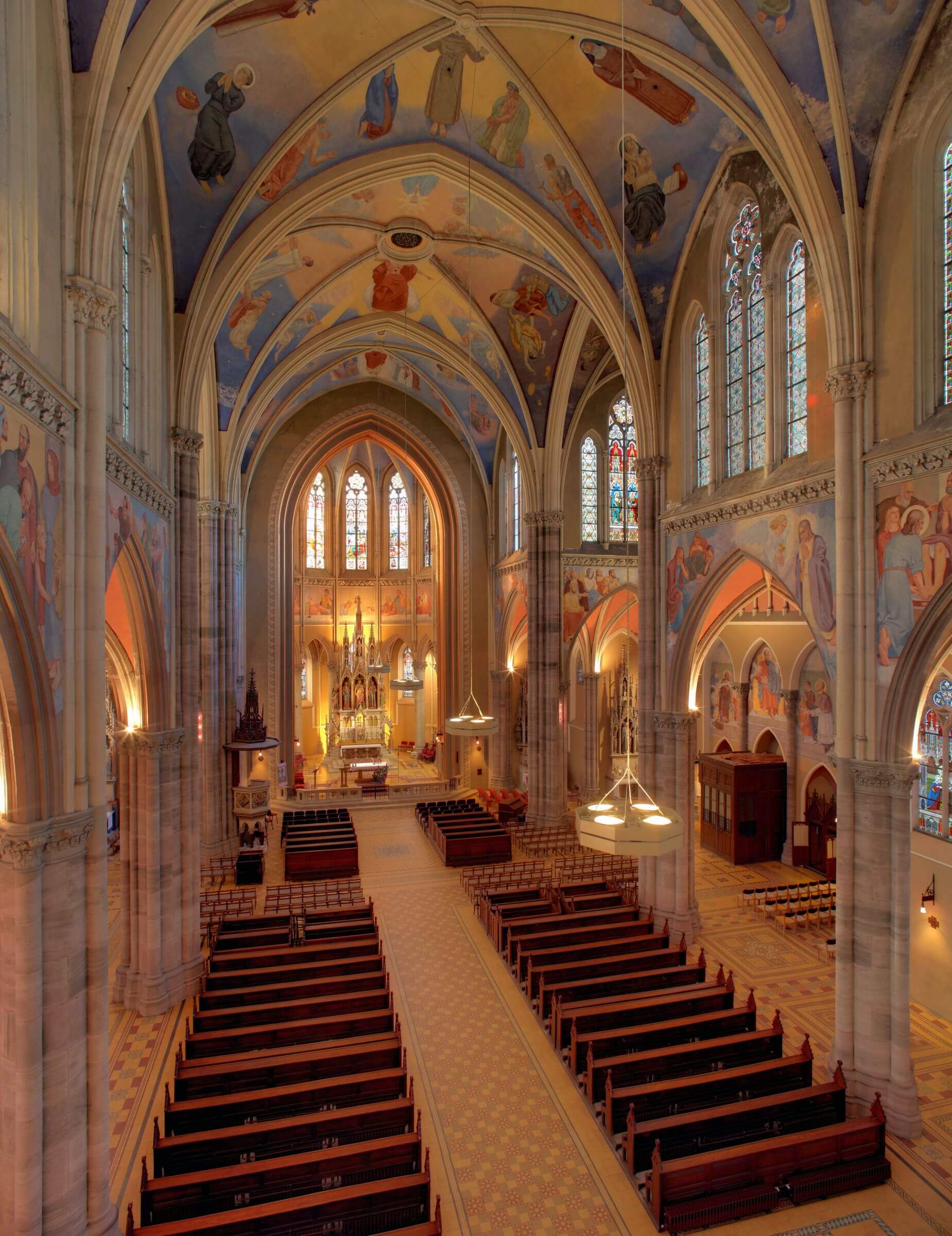
Osijek Co-cathedral of St Peter and St Paul (photo credit: Mario Romulić)
The active second day can be continued with biking near the Drava River, Podravina forests that astonish with its greenery, and used for refreshment on the famous Osijek beach on Drava River Copacabana or how locals call it, “Kopika”. This famous beach went through multiple renovations in recent years and today offers various options for relaxation and hanging out with your friends. If you’re up to it, get rid of your bikes and put on your swimsuits because this feature in our 48 hours in Osijek guide, is most certainly a must.
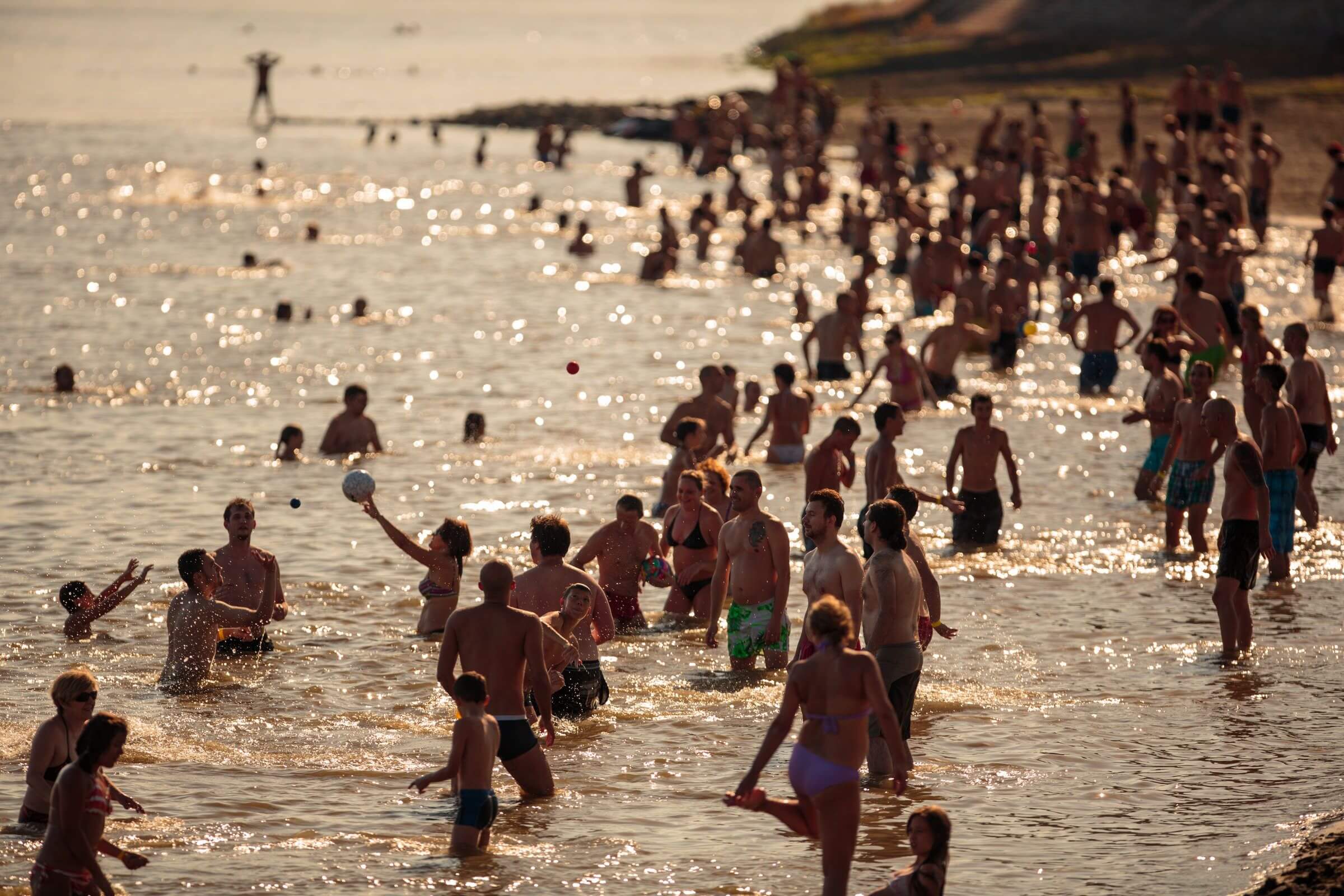
Famous Kopika (photo credit: Mario Romulić)
8.00 p.m. - onwards
After refreshments, it’s time to explore the nightlife in Osijek. This section is for both days in one since options are plentiful and, in most cases, you won’t make a mistake. However, these are the most famous ones that can make any list in Croatia. Definitely visit Radić Street which is teeming with pubs of all kinds and some of them are named after famous European cities - Barcelona and Amsterdam. In the recent past, there were New York and London but unfortunately, they haven’t survived. Even with those two gone, Barcelona and Amsterdam are still the ultimate picks if you want to see where the urban youth of Osijek and other parts of Slavonia love to go. Also, pub quizzes are amazing.
For drink/cocktail connoisseurs we recommend The Craft Room. The Craft Room bar is located right in the center of the town of Osijek. This concept bar is unique in this region because they offer a wide range of Gin and Whiskey from all over the world. Creative cocktails with innovative ingredients and award-winning bartender Miroslav Kljajić make this bar an unavoidable place to visit.
Beer lovers, do not fret! Gajba, a pub and tasting room, has every beer you want. From pale ales, lagers and so many other homegrown and worldly types of beers, this place is heaven for people who want to explore beer culture, not just of Osijek, but any European brew. If you want to visit soon, come just in time for the Craft Beer Festival that’s organized by, you guessed it, Gajba Pub.
If you think that’s all, it isn’t. Real nightlife is located in Tvrđa, where multiple nightclubs like Memories, Q Club, and more attract youth from Osijek and beyond. Foreign and domestic music “strikes” in all directions but one is an odd one out. If you want to hear Croatian live music tamburitza, go to Fort Pub - the Slavonian atmosphere and excited people make this place even better.
The end of the 48 hours of Osijek is almost done but not before leaving you visit Gold by Waldinger and Slatka Tvornica for some Slavonian sweetness - krempita, cakes, traditional Slavonian sweets, and a cup of coffee with travarica on the side? You can't go wrong.
We will end it here. This is our 48 hours in Osijek and hopefully, this guide will encourage you to come to visit Osijek, the heart of Slavonia. We deliberately left out nature park Kopački rit and the Baranja region because we wanted to emphasize how the city itself has so many things to offer. Still, that doesn't mean you shouldn't visit Baranja and the nature park because, at the end of the day, everything's connected. When talking about Osijek or Slavonia, people always say that the city or the region is underrated. I truly think it's not. What makes this area so beautiful and attractive to visitors is that people are not burdened by unrealistic expectations: we will never have tourist offers like Dubrovnik, Dalmatia, and Istria or the beautiful Adriatic Sea. We know our worth and that's why most of the time tourist goes home with a smile on their face. Charm, humility, and accepting people with open arms are our best tools. That's why Osijek is not underrated - it's properly rated.
Interested in bike tours of Slavonia? Check this article.
For more on travel in Croatia, follow TCN's dedicated page.
Roundtable Discussion: Croatia Urgently Needs Demographic Revitalisation Strategy
ZAGREB, 26 April 2022 - Croatia urgently needs a national demographic revitalisation strategy that will be binding on all future governments, heard a round table organised by the Social Democrats parliamentary group on Tuesday.
This is a national issue above party politics that requires a consensus, and action plans as part of a 10-year national demographic revitalisation strategy should be mandatory for all future governments, it was said at the round table organised in cooperation with the Department for Demography and Croatian Expatriate Community at the Faculty of Croatian Studies.
"Now is the last moment for resolute social action to slow down and halt the negative trends," the group's whip, Ivana Posavec Krivec, said.
The Social Democrats recalled the latest preliminary results of the population census, which they described as alarming.
"Croatia has lost 9.25% of its population in 10 years and now has 3,888,529 residents. In addition to the population decline, caused by the low birth rate and emigration, we are among the oldest European nations," she said.
Deputy Parliament Speaker Davorko Vidović said the key problem was "the lack of political will and inability of the political elite" to define a broader project and broader vision of where Croatia should be in 20 or 30 years' time.
"We lack a strategic document and key vision so it is no wonder we don't have a solution for individual areas such as demography," he added.
Professor Anđelko Akrap from the Demographics Department at the Faculty of Economics said that "Croatia has never implemented a demographic policy which costs, just like any other production."
Akrap: Only Croatia, Romania, Latvia and Bulgaria have a negative natural increase rate
"Only Croatia, Romania, Latvia and Bulgaria have a negative natural increase rate and negative net migration, other countries only have emigration," he said, noting that the negative trends would impact GDP growth.
Professor Tado Jurić of the Croatian Catholic University underscored that not one other EU member state apart from Croatia had experienced a 10% population decrease in eight years.
He noted that economic reasons were not the only reasons why people are emigrating.
"Surveys have shown that lack of security and injustice are the main reasons why people emigrate," he said.
The only way Croatia can resolve its demographic problem is with immigration. We need positive population measures. Classic demographic measures are useless if they are not accompanied by a resolute fight against corruption and nepotism, concluded Jurić.
For more, make sure to check out our dedicated lifestyle section.
Attitudes Regarding COVID Vaccination of Children, Pregnant Women Discouraging
ZAGREB, 26 April 2022 - The results of a survey regarding parents' and pregnant women's attitude toward vaccination against COVID-19 are discouraging and we may be faced with a new wave of the epidemic in the autumn, Goran Tešović of the Zagreb Infectious Diseases Hospital said on Tuesday.
Presenting the results of the survey on the occasion of European Immunisation Week, Tešović, who is a pediatrician and infectious disease doctor, said that about 20% of parents were willing to have their children immunised against COVID, 45% were hesitant while 35% said they would not vaccinate their children.
The survey was conducted at the end of 2021 and early 2022 in three large Croatian cities - Zagreb, Osijek and Split, and it covered 1,000 parents.
People who have been vaccinated believe their children should be inoculated too, said Tešović. About 30% of those who have been vaccinated support vaccination while only 3% of those who haven't been do.
A survey conducted among 430 pregnant women between May and October 2021 at two health institutions in Zagreb shows that more than 80% would not get vaccinated against COVID and that only 16% would get vaccinated.
"Those results are fairly discouraging and indicate that pregnant women are still in doubt regarding the efficiency and safety of COVID vaccines even though most of them are aware of the dangers of COVID during pregnancy," said Tešović. Even though the virus is perceived as having disappeared, we still have about 100 cases a day and there will most likely be another wave of the epidemic in the autumn, he warned.
An immunology expert, head of the department for viral immunology at the Helmholtz Centre for Infection Research and associate professor at the Faculty of Medicine in Hannover, Luka Čičin-Šain, underscored that the technology to produce vaccines is constantly being developed, their efficiency is increasing and any side-effects are decreasing.
Since the discovery of vaccines, the expected lifespan has increased between 15 and 25 years. Vaccination is the greatest medical achievement of modern civilisation and can prevent more than 20 potentially life-threatening diseases, he underscored.
Prior to the introduction of vaccination, there were more than 10,000 cases of mumps a year in Croatia and after vaccination was introduced, those numbers dropped drastically. After a second dose was introduced, the number practically dropped to zero, said Čičin-Šain. COVID vaccines were developed in record time, they have also changed the dynamics of the pandemic and saved countless lives.
European Immunisation Week is marked across Europe every year in the final week of April. It aims to raise awareness of the importance of immunisation for the general health and wellbeing of the European and wider population.
For more, make sure to check out our dedicated lifestyle section.
Police Investigating Incident With Chetnik Stickers in Knin
ZAGREB, 26 April 2022 - Šibenik-Knin police confirmed on Tuesday that they are investigating an incident in which several stickers with Chetnik symbols were put on public lamp posts in Knin over the past weekend.
A spokesman for the Šibenik-Knin County police departement, Šime Pavić, said that on Sunday the police noticed stickers with Chetnik symbols on several public lamp posts and that the incident was being investigated.
In a statement for the Slobodna Dalmacija daily, Knin Mayor Marijo Čačić said that he is convinced that the perpetrators were not from Knin. "Their intention is to stir the waters in what is usually a peaceful life in Knin," Čačić said, underscoring that there is no tension among the local population.
He added that the town's municipal officers had inspected local CCTV webcams together with the police in an effort to identify the perpetrators.
Former Knin mayor and incumbent county head Marko Jelić made a similar comment. "The fact is that the past Easter holidays is a period when many people who moved away from Knin visit their hometown. Some of them nurture feelings that are certainly not Christian and create problems for us all, particularly for the Orthodox Serb community in Croatia," Jelić said.
For more, make sure to check out our dedicated politics section.
Milanović: Finland, Sweden Can't Join NATO Before Bosnia Election Law Changed
ZAGREB, 26 April 2022 - Croatian President Zoran Milanović said on Tuesday that Finland and Sweden could not join NATO before the election law in Bosnia and Herzegovina was changed.
The Croatian parliament "must not ratify anyone's accession to NATO" until that law is changed, he told the press. The accession of Finland and Sweden can be discussed, but it is "a very dangerous adventure," he added.
In the wake of Russia's invasion of Ukraine, next month the two countries will state their wish to join NATO, their media reported yesterday.
Milanović said that formally he could not decide on his own on their accession to NATO but called it "very dangerous charlatanism."
"As far as I'm concerned, let them join NATO... but until the issue of the election law in BiH is solved, until the Americans, the English, the Germans, if they can and want to, force (Bosniak officials) to change the election law in the next six months and give Croats their fundamental rights, the Sabor must not ratify anyone's accession to NATO."
Milanović said "we are in a terrible situation" because Bulgaria and Romania cannot join Schengen, North Macedonia and Albania cannot begin EU accession negotiations and Kosovo has not been recognised, while Finland "can join NATO overnight."
We are only asking that Finland and Sweden "tell the Americans to solve this," he said. "For me, that's a vital national interest of the Croatian state, nation and people, that BiH be a functioning state."
Milanović said he raised this issue with his French and German counterparts, but that Prime Minister Andrej Plenković, due to his function, had a lot more room for that. "But he is neglecting that consciously and cowardly."
Asked if Croats in BiH should boycott general elections in October unless the election law was changed, Milanović said he did not know at the moment. "It seems to me the feeling among Croats in BiH is that they shouldn't boycott so as not to bring into question local government."
Commenting on the victory of manager Robert Golob and his party in Sunday's parliamentary election in Slovenia, he said Slovenia had been "left-liberal" for the past 30 years.
Croatia-Slovenia relations have been "really good" in the past two years, he said, adding that this was due also to Prime Minister Janeza Janša, who was defeated in Sunday's vote.
"We have seen that Croatia-Slovenia relations have been more stable when Janša was in power, but they were not hostile when the left was in power either."
Tanja Fajon, whom Slovenian media say might be the new foreign minister, was in the past against Croatia's accession to Schengen.
"If they want to prevent Croatia's Schengen entry, okay. Croatia won't go down because of that. They will cause damage to themselves," said Milanović.
He said Croatia was ready for Schengen already in 2015, but added that it was "a political decision and torture." He also criticised the fact that Bulgaria and Romania have not yet entered Schengen, despite being in the EU since 2007.
"Slovenia will, if it looks after its interests, ask that Croatia join Schengen. If not, if will have to hire another 20,000 police officers," said Milanović, who is meeting with Slovenian President Borut Pahor later today.
For more, make sure to check out our dedicated politics section.


